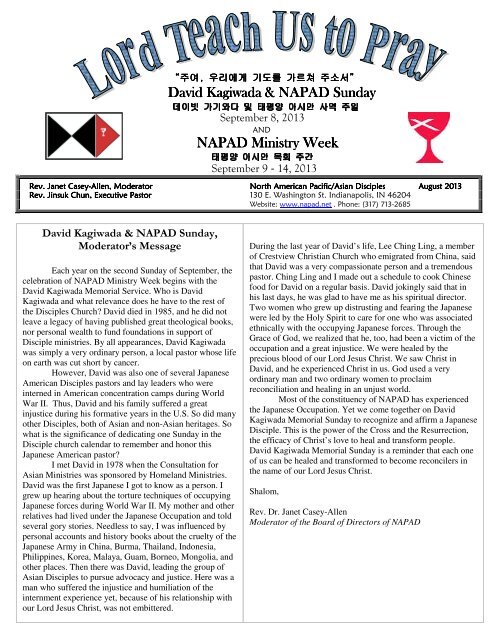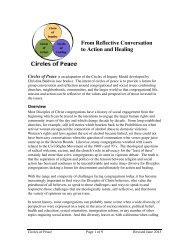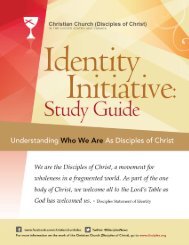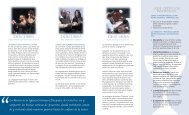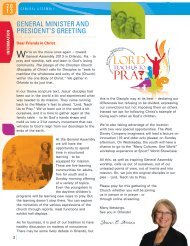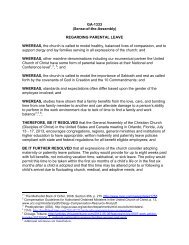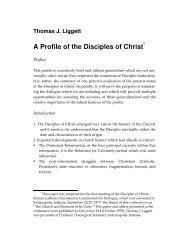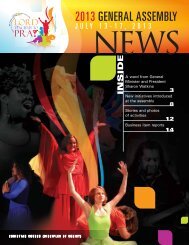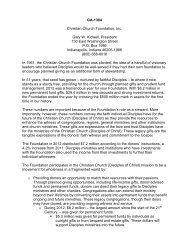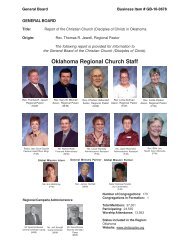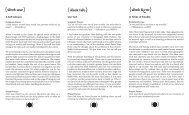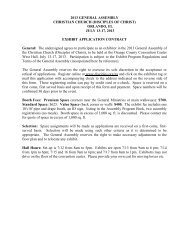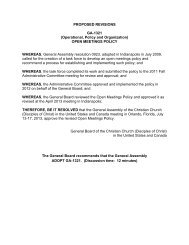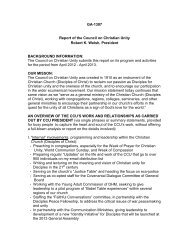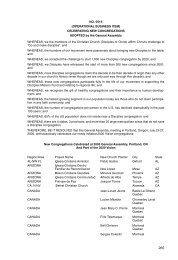David Kagiwada David Kagiwada & NAPAD Sunday NAPAD ...
David Kagiwada David Kagiwada & NAPAD Sunday NAPAD ...
David Kagiwada David Kagiwada & NAPAD Sunday NAPAD ...
You also want an ePaper? Increase the reach of your titles
YUMPU automatically turns print PDFs into web optimized ePapers that Google loves.
“주여<br />
주여, 우리에게 기도를 가르쳐 주소서”<br />
<strong>David</strong> <strong>Kagiwada</strong> & <strong>NAPAD</strong> <strong>Sunday</strong><br />
데이빗 가기와다 및 태평양 아시안 사역 주일<br />
September 8, 2013<br />
AND<br />
<strong>NAPAD</strong> Ministry Week<br />
태평양 아시안 목회 주간<br />
September 9 - 14, 2013<br />
주간<br />
Rev. Janet Casey-Allen<br />
Allen, Moderator<br />
North American Pacific/Asian Disciples August 2013<br />
Rev. Jinsuk Chun, , Executive Pastor 130 E. Washington St. Indianapolis, IN 46204<br />
Website: www.napad.net . Phone: (317) 713-2685<br />
<strong>David</strong> <strong>Kagiwada</strong> & <strong>NAPAD</strong> <strong>Sunday</strong>,<br />
Moderator’s Message<br />
Each year on the second <strong>Sunday</strong> of September, the<br />
celebration of <strong>NAPAD</strong> Ministry Week begins with the<br />
<strong>David</strong> <strong>Kagiwada</strong> Memorial Service. Who is <strong>David</strong><br />
<strong>Kagiwada</strong> and what relevance does he have to the rest of<br />
the Disciples Church? <strong>David</strong> died in 1985, and he did not<br />
leave a legacy of having published great theological books,<br />
nor personal wealth to fund foundations in support of<br />
Disciple ministries. By all appearances, <strong>David</strong> <strong>Kagiwada</strong><br />
was simply a very ordinary person, a local pastor whose life<br />
on earth was cut short by cancer.<br />
However, <strong>David</strong> was also one of several Japanese<br />
American Disciples pastors and lay leaders who were<br />
interned in American concentration camps during World<br />
War II. Thus, <strong>David</strong> and his family suffered a great<br />
injustice during his formative years in the U.S. So did many<br />
other Disciples, both of Asian and non-Asian heritages. So<br />
what is the significance of dedicating one <strong>Sunday</strong> in the<br />
Disciple church calendar to remember and honor this<br />
Japanese American pastor?<br />
I met <strong>David</strong> in 1978 when the Consultation for<br />
Asian Ministries was sponsored by Homeland Ministries.<br />
<strong>David</strong> was the first Japanese I got to know as a person. I<br />
grew up hearing about the torture techniques of occupying<br />
Japanese forces during World War II. My mother and other<br />
relatives had lived under the Japanese Occupation and told<br />
several gory stories. Needless to say, I was influenced by<br />
personal accounts and history books about the cruelty of the<br />
Japanese Army in China, Burma, Thailand, Indonesia,<br />
Philippines, Korea, Malaya, Guam, Borneo, Mongolia, and<br />
other places. Then there was <strong>David</strong>, leading the group of<br />
Asian Disciples to pursue advocacy and justice. Here was a<br />
man who suffered the injustice and humiliation of the<br />
internment experience yet, because of his relationship with<br />
our Lord Jesus Christ, was not embittered.<br />
- 1 -<br />
During the last year of <strong>David</strong>’s life, Lee Ching Ling, a member<br />
of Crestview Christian Church who emigrated from China, said<br />
that <strong>David</strong> was a very compassionate person and a tremendous<br />
pastor. Ching Ling and I made out a schedule to cook Chinese<br />
food for <strong>David</strong> on a regular basis. <strong>David</strong> jokingly said that in<br />
his last days, he was glad to have me as his spiritual director.<br />
Two women who grew up distrusting and fearing the Japanese<br />
were led by the Holy Spirit to care for one who was associated<br />
ethnically with the occupying Japanese forces. Through the<br />
Grace of God, we realized that he, too, had been a victim of the<br />
occupation and a great injustice. We were healed by the<br />
precious blood of our Lord Jesus Christ. We saw Christ in<br />
<strong>David</strong>, and he experienced Christ in us. God used a very<br />
ordinary man and two ordinary women to proclaim<br />
reconciliation and healing in an unjust world.<br />
Most of the constituency of <strong>NAPAD</strong> has experienced<br />
the Japanese Occupation. Yet we come together on <strong>David</strong><br />
<strong>Kagiwada</strong> Memorial <strong>Sunday</strong> to recognize and affirm a Japanese<br />
Disciple. This is the power of the Cross and the Resurrection,<br />
the efficacy of Christ’s love to heal and transform people.<br />
<strong>David</strong> <strong>Kagiwada</strong> Memorial <strong>Sunday</strong> is a reminder that each one<br />
of us can be healed and transformed to become reconcilers in<br />
the name of our Lord Jesus Christ.<br />
Shalom,<br />
Rev. Dr. Janet Casey-Allen<br />
Moderator of the Board of Directors of <strong>NAPAD</strong>
A Disciples Affirmation of Faith<br />
AS MEMBERS OF THE CHRISTIAN CHURCH,<br />
We confess that Jesus is the Christ,<br />
the Son of the living God,<br />
and proclaim him Lord<br />
and Savior of the world.<br />
In Christ’s name and by his grace<br />
we accept our mission of witness<br />
and service to all people.<br />
We rejoice in God,<br />
maker of heaven and earth,<br />
and in the covenant of love<br />
which binds us to God and one another.<br />
Through baptism into Christ<br />
we enter into newness of life<br />
and are made one with the whole people of God.<br />
In the communion of the Holy Spirit<br />
we are joined together in discipleship<br />
and in obedience to Christ.<br />
At the table of the Lord<br />
we celebrate with thanksgiving<br />
the saving acts and presence of Christ.<br />
Within the universal church<br />
we receive the gift of ministry<br />
and the light of scripture.<br />
In the bonds of Christian faith<br />
we yield ourselves to God<br />
that we may serve the One<br />
whose kingdom has no end<br />
Blessing, glory and honor<br />
be to God forever. Amen.<br />
제자교회 신앙 선언<br />
크리스천 교회 (제자회) 신도로서,<br />
우리는 예수님이 그리스도시요,<br />
살아계신 하나님의 아들이심을 고백하며,<br />
그가 세상의 주님과 구주이심을<br />
선포합니다.<br />
그리스도의 이름과 그의 은혜로<br />
우리는 모든 사람들에게 증인 됨과<br />
섬김의 사명이 있음을 인정합니다.<br />
하늘과 땅을 지으신 하나님을 인하여,<br />
또한 우리를 하나님께와 서로에게<br />
결속시키는 사랑의 언약을 인하여<br />
우리는 기쁨을 누립니다.<br />
그리스도와 하나되는 세례를 통하여<br />
우리는 새 생명을 얻으며<br />
하나님의 온 백성과 하나가 됩니다.<br />
성령께서 이루시는 친교로서<br />
우리는 그리스도의 제자됨과<br />
주님께 순복하는 일에 합심합니다.<br />
주님의 성만찬 상에서<br />
우리는 그리스도의 구원역사와<br />
그의 임재를 감사하며 경축합니다.<br />
만국 교회 안에서<br />
우리는 복음사역의 은사와<br />
성경의 빛을 받습니다.<br />
그리스도교 신앙의 유대 안에서<br />
우리는 영원한 나라의 주님을<br />
섬기고자 하나님께 헌신합니다.<br />
찬양과 영광과 존귀가<br />
하나님께 영원하소서. 아멘<br />
- From the Preamble of the Design for the Christian Church (Disciples of Christ)<br />
- 2 -
Material for <strong>Sunday</strong> Preaching & Weekly Studying (1)<br />
KODOMO NO TAME NI<br />
For the Sake of Our Children<br />
Presented by JoAnne <strong>Kagiwada</strong> at the Wednesday Morning Gathering in General Assembly, Orlando,<br />
Florida on July 13-17, 2013.<br />
The phrase kodomo no ta-me ni (for the sake of our children) was used as a mantra throughout the<br />
Japanese American community in the 1940s and '50s as a call to the critical mission of making sure the<br />
events of World War II would never be repeated. Through drama and personal reflection, JoAnne<br />
<strong>Kagiwada</strong> and Young Lan Kim explored the internment of Japanese Americans in the U.S. and issued the<br />
call to Disciples that such injustice never happen again.<br />
<strong>Kagiwada</strong> directed the final lobbying push for an official apology and reparations from the U.S.<br />
government for the 65,000 Japanese Americans interred during the war. Following graduation from law<br />
school, she directed the Disciples of Christ work in international affairs, representing the denomination at<br />
the National Council of Churches.<br />
On October 9, 1990, the Great Hall in the U.S. Department of Justice was filled to capacity, with<br />
everyone’s attention riveted on nine elderly individuals seated on the dais. They all were over 90 years old.<br />
The oldest was 107. We watched as Attorney General Dick Thornburgh dropped to his knees to reach their<br />
wheelchairs and handed each of them a statement of apology signed by President George H.W. Bush and a<br />
U.S. government check for $20,000. These were the first payments under the Civil Liberties Act of 1988 –<br />
the landmark law in which the nation formally apologized for the internment of Japanese Americans during<br />
World War II and pledged to pay $1.25 billion to more than 60,000 internees still alive on August 10, 1988,<br />
the date that President Reagan signed the bill into law. 2013 marks the 25 th anniversary of the signing of the<br />
Civil Liberties Act.<br />
World War II is almost ancient history, not within the lifetimes of many who are here. For some, our<br />
families were not living in this country yet. And most of us who are old enough to remember World War II<br />
didn’t hear this story then. Some of us recall the weekly newsreels at the movie theater. Do you remember<br />
how the world changed in 1980 when CNN began its 24 hour news coverage around the globe? Now some<br />
of us post and tweet and blog spreading news almost before it happens.<br />
The bombing of Pearl Harbor by Japanese fighter planes marked U.S. entry into World War II at the end of<br />
1941. Citing military necessity, the government posted orders in public places in the West Coast states,<br />
instructing all persons of Japanese ancestry, both alien and non-alien –the old, the young, the infirm, and<br />
children, including orphans -- to report to designated “Reception Centers” from which they were moved to<br />
temporary assembly centers (often horse stalls at local county fairgrounds or race tracks) while permanent<br />
encampments were being constructed. Some were given only one day’s notice. Forced to leave homes,<br />
businesses, farms, and limited to bringing only what they could carry, Japanese American families were<br />
herded onto buses and trains guarded by armed soldiers and taken to 10 camps located in remote, desolate<br />
areas of the country. The government justified this action as a preventive measure made necessary by the<br />
high risk of sabotage or attack on U.S. strategic installations. When government documents were finally<br />
declassified in the 1970’s, there was not one single incident to support this assertion.<br />
- 3 -
More than 110 thousand people spent the war years in those concentration camps. Entire families were<br />
crowded into one-room units in crudely constructed barracks surrounded by barbed wire and sentry towers<br />
which were manned by guards with their rifles pointed at the residents. The barracks were lined up, row<br />
upon row, each holding six families. The dividing walls did not reach the ceiling. Privacy did not exist.<br />
Other barracks held communal latrines, communal bathing facilities and communal dining halls.<br />
Two/thirds of those folks were U.S. citizens by birth (another term for what the government posters had<br />
designated as non-alien). In 1790, Congress passed a law stating that only free white aliens could become<br />
naturalized citizens. In 1870 the law was broadened to include people born in Africa or of African descent.<br />
Thus their immigrant parents were barred by law from becoming naturalized citizens. The McCarran –<br />
Walter Act finally gave the right to citizenship to all immigrants. In 1952.<br />
The internment in the concentration camps was so traumatic, so shameful to have suffered through, it was<br />
too painful to talk about. Most did not talk about what had happened, even within their own families. They<br />
hoped that silence would erase the awful memories. When their children became old enough to ask, their<br />
questions were often left unanswered or deflected. The psychological price of trying to deal with such<br />
devastating pain was very costly.<br />
It’s understandable that there was a significant level of ambivalence within the community when in the<br />
1970’s, some began to advocate calling upon the government to provide monetary redress for the injustices<br />
that the internment had inflicted upon Japanese Americans. It was the younger generation, immersed in the<br />
activism of the civil rights movement, who demanded that our government be called into account for such<br />
egregious violations of a whole community’s human rights and civil liberties. This righteous activism<br />
clashed with resounding dissonance against the protective armor of silence that internees had constructed<br />
for their personal survival.<br />
Over time, consensus began to build that redress was not about monetary payment. Redress was about the<br />
healing of wounds through confronting injustice. And in the end, the constitutional rights rationale was<br />
agreed upon and Americans of Japanese ancestry asserted their right to petition the government for redress<br />
of grievances. A Congressional commission held public hearings in ten cities across the nation. It heard<br />
testimony from government and military officials and former internees. Young and old together, children<br />
and grandchildren listened to their elders and helped them to write down what had happened. Reluctant to<br />
step forward, internees shared stories expressing emotions that had never before been uttered out loud – not<br />
even within their own families. In the process a collective memory began to emerge, crossing generational<br />
lines. As individual stories became community stories, the healing process began. There was a growing<br />
understanding of the need for the younger generations to know this traumatic history as part of their own<br />
life story. The community acted for the sake of the children.<br />
From the hearings, the commission issued a two-volume report titled Personal Justice Denied. Their report<br />
expressly repudiated the “military necessity” rationale for the forced removal and incarceration of Japanese<br />
Americans. It further cited racial prejudice, war hysteria and a failure of political leadership as the broad<br />
historical causes of those orders. The commission’s recommendations for a government apology, individual<br />
compensation and an educational foundation became the basis for the Civil Liberties Act of 1988 enacted<br />
by Congress.<br />
A good friend was pastor of a Disciples church in Ohio. He was asked to speak to his fellow pastors at one<br />
of their regular noon-time meetings. A mild and gentle person, he shared his family’s experiences during<br />
the war. One of the pastors became very agitated, banged his fist on the table and shouted at him: “You’re<br />
lying! Our government would never do a thing like that!” and he stomped angrily out of the room.<br />
- 4 -
The redress campaign had two goals. One was the government apology and symbolic monetary award –<br />
hopefully significant enough to deter future violations of constitutional rights, but also clearly understood<br />
as a symbolic token never to be considered a price tag for such rights. Just as important to the community<br />
was the second goal: to ensure that what had happened to Japanese Americans would never be allowed to<br />
happen again to any other group of people.<br />
I headed the office in Washington that managed the lobbying and education efforts during the final phase of<br />
the redress campaign -- that is, securing the appropriations to fund the government monetary awards that<br />
were promised in the Civil Liberties Act. As many of you know, there’s a difference between<br />
“authorizing” funds and “appropriating” them. Committed and influential leadership in the Senate was key<br />
to the success of this campaign. But how could a small minority group, mostly living on the West Coast,<br />
not politically powerful, get Senators and Representatives all across the country to support appropriations<br />
for something that happened almost 50 years ago? Without the huge outpouring of support of faith groups<br />
and civil liberties organizations whose constituencies lived in all those places across the country where<br />
there were very few, if any, Japanese Americans, but were strongly convicted in their hearts that a grave<br />
injustice had occurred, I am very sure that the story would have a different ending. And that poignant longawaited<br />
celebration at the Hall of Justice would not have happened.<br />
Following the 9/11 bombings of the World Trade Center, there were angry demands for reprisals against<br />
the terrorist attackers. In the minds of many, that anger and suspicion was directed at a particular group of<br />
people, based on racial profiling. The Japanese American community remembered and spoke out<br />
collectively and as individuals to remind us all that what happened during World War II should not happen<br />
again. We know that a threat upon the rights of one group is a threat to the whole.<br />
We live in turbulent times. We struggle with an onslaught of polarizing cultural and political issues. And<br />
there are no easy answers – no crystal clear logic that is persuasive and irrefutable. Sometimes, I am faced<br />
with the reality that what I believe is true and right is in direct opposition to a friend’s conclusion. For me,<br />
there is wisdom learned from the Japanese American community’s struggle with redress. We learn from<br />
each other and we seek to do the best that we can, acting for the sake of our children.<br />
Almost every day, we learn of another act of terrorism or violence. The parents of the children who were<br />
gunned down at Sandy Hook school in Newton, Connecticut share their stories hoping that others will join<br />
them in working for ways for our nation to combat gun violence. Grieving the terrible tragedy that they<br />
have suffered, they are moved to act for the sake of all our children.<br />
Emotions run high in describing the dire consequences of an immigration system that is not working, but in<br />
spite of more and more enforcement measures, increasing border security does not seem to be the solution.<br />
Some parents seeking a better life for their young children came to this country without legal immigrant<br />
status. Now those children are confronted by the fact that their parents’ actions will thwart their aspirations<br />
to fulfill the American dream of education and meaningful work. Surely we need to find a way to make our<br />
national immigration policy work better – for the sake of our children.<br />
Gathered here at the General Assembly, we find ourselves in the midst of difficult discussions about how<br />
we live into the community of grace-filled life in the ministry of the church – who does that include? Are<br />
sexual orientation and gender identification barriers to who can share in fellowship as the body of Christ?<br />
Perhaps, but we all know that this puts us at risk of excluding our children from this holy fellowship.<br />
I believe that the love of God is working through us. We are called to share our stories with each other and<br />
explore the path of faith together. Offering each other encouragement and celebrating the joys of discovery,<br />
we strive to be faithful witnesses of God’s love and grace. We know that we are all one in God’s family<br />
and what we do for the sake of our children is for the sake of all God’s children. Kodomo no tame ni.<br />
- 5 -
Material for <strong>Sunday</strong> Preaching & Weekly Studying (2)<br />
Jesus’ Way to Win Against Discrimination:<br />
The “Golden Rule” (Matthew 7:12)<br />
Spoken by Rev. Jinsuk Chun for the Tuesday Reconciliation Breakfast at General Assembly in Orlando,<br />
Florida, on July 13-18.<br />
“So in everything, do to others what you would have them do to you, for this sums up the Law and the<br />
Prophets.”<br />
I appreciate Rev. April Johnson for giving me this opportunity to share my faith and thoughts in this<br />
wonderful breakfast meeting of Anti-racism and Pro-reconciliation. As you know, I have worked as<br />
Executive Pastor since the last summer. Rev. Dr. Geunhee Yu, my predecessor, left me with much valuable<br />
advice. He said that I should participate in Anti-racism and Pro-reconciliation ministries very, very actively.<br />
That was self-evident for me, so I am doing my utmost to fully participate in these ministries.<br />
This morning, I would like to share with you about the too-famous phrase by Jesus, as people like to call<br />
the Golden Rule. However, I do not want to see these words through the ethical perspective, but through the<br />
Christian worldview. The commandment, “So in everything, do to others what you would have them do to<br />
you,” means that we need have a new way of thinking or lifestyle. My interpretation is that we need the<br />
mindset of "YOU ARE GOD’S PRECIOUS CHILD.” In truth, such a lifestyle has been the essence of<br />
God’s words from OT to NT. I’m confident that when we live such a life style, we can find clear ways to<br />
destroy any kind of discrimination in our life.<br />
I grew up in a family dominated with a culture of severe sexual discrimination. I remember that when my<br />
girl cousins visited my house and ate together with us, my grandmother took their rice bowls away from<br />
our table, brought them to the kitchen, and arranged a separated table for them. And she scolded them with<br />
harsh words, “how dare you sit together with your uncles?” But, I, as a male and the first son, was always<br />
allowed to eat with them. I almost always had feelings of guilt towards my girl cousins and treated them<br />
very kindly, but I never protested against my grandmother and I never tried to correct such discriminating<br />
culture. I was tolerant towards my girl cousins, while enjoyed all kinds of benefits given to me. There coexisted<br />
two different attitudes in me, which was really bad. I grew up in such a family culture and I felt<br />
some pain. That's when I decided that our family must not live in such a culture.<br />
When I arrived in the US, my first daughter, Sarah, was seven years old. My prayer was that she could<br />
adapt well to her new life in America without culture shock. She initially could not speak English and had<br />
no friends. After six months of Sarah attending her first class at elementary school in Claremont, CA, we<br />
received a letter from school saying that Sarah would be awarded for her academic excellence, and we were<br />
invited to a celebration event. Do you know what my immediate response to her was? If you were me, how<br />
would you respond to her? Yes, good job! Congratulations! I’m proud of you! And so on. But my response<br />
was different. It was “how many students will get the award?” I could not forget my daughter’s face at that<br />
time. She could not understand my question at all. She just looked at me. My response was almost<br />
automatic. It was the immediate response coming from my thought or worldview that being number one<br />
over everyone else can help her earn respect and dignity from her society. Such an idea was prevalent for<br />
me. I thought that there was no other way except through excelling in education for my girls to live with<br />
dignity in a racially, sexually, and culturally discriminating society. I likely believed that through personal<br />
- 6 -
achievement, my kids could be freed from such limitations. At the time, I had no concern for ‘structural’<br />
discrimination.<br />
But, I had a horrible experience to help me think of the life as minority in our society. You can remember<br />
that some years ago a Korean American student of Virginia tech shot innocent students on campus. This<br />
senseless and tragic behavior had a huge impact on the Korean community and me also. The first response<br />
was rage and then fear – the fear of possible reaction to Koreans with physical violence by society. People<br />
said that it was personal misbehavior, and it was not an ethnic issue. It is a reasonable argument. In fact,<br />
many media outlets were careful not to represent in a wrong way such a tragic occurrence. But many<br />
Koreans could not think with that way. They suffered from psychological pressure and pain just because he<br />
was Korean.<br />
It is the general response happening in societies in which structural prejudice and discrimination against<br />
minority groups exist. Although it may be different in terms of intensity, I have experienced the same thing<br />
in Korea, Germany, and USA. When a leader from a minority group makes a mistake, she/he must be<br />
blamed with “This is Asian,” “This is Korean,” “This is woman.” Therefore, they must exert themselves<br />
twice as much, because their mistake brings about the blame to their own race or sex.<br />
To break down this evil pattern, personal ethical behavior and social politics are not enough. We need to<br />
change our fundamental ways of life, worldview, and paradigm. I, as a Christian, want to implement a<br />
lifestyle in which I always regard You as a God’s precious child. The tolerance of minor groups may be<br />
just an act of sharing small pieces among the social majority. Regarding You as a God’s precious child is<br />
not tolerance. It is the recognition of fact. It is the brave act to recognize and confirm that You are a God’s<br />
precious child beyond the difference of sex and color. All of us were created in God’s image and given<br />
great gifts. So there must be better things in all humans. Confucius once said, “Whenever three friends<br />
walk together, you can ALWAYS find a teacher among them.” I believe that Jesus taught us exactly the<br />
same thing. When we recognize and celebrate the fact that you are God’s precious child in a culturally and<br />
racially diverse society, we can open the way in which we can break down the structure of discrimination<br />
and re-establish a new human relationship.<br />
- 7 -
<strong>David</strong> <strong>Kagiwada</strong> & <strong>NAPAD</strong> <strong>Sunday</strong>데이빗<br />
(This is a guide for your worship service. Please adapt the service to the needs of your congregation. We<br />
encourage you to invite members of the congregation from all ages and genders to share in reading the<br />
scriptures, leading in singing and prayers, and sharing their own stories of witness) 이것은<br />
데이빗 가기와다 및 태평양아시안<br />
사역 주일<br />
For the liturgy resources that we used for the past 7 years, click here<br />
주일 예배 기념<br />
SUNDAY, SEPTEMBER 8,<br />
예문입니다. 교회 실정에 맞게 수정/보충하여 사용하십시오. 예배의 모든 순서에 나이와 성별을 망라하여 여러 사람이 참여 할 수 있도록 배려 하시기 바랍니다)<br />
2013<br />
A TIME OF<br />
FELLOWSHIP AS WE GATHER TOGETHER<br />
PRELUDE (전주)<br />
PASTORAL GREETINGS 소개)<br />
In the history of <strong>NAPAD</strong>, Rev. <strong>David</strong> <strong>Kagiwada</strong> is a very significant minister who inspired people<br />
to ministry and leadership in the greater church. He was a second generation Japanese Disciple<br />
of Christ who was a strong advocate for unity and reconciliation among cultures and<br />
communities. As we recognize his contributions in Disciples of Christ, we remember his<br />
ministry and life with his everlasting spirit of peace, unity and justice.<br />
(인사<br />
인사 및 소개<br />
아시안 역사속에서 가기와다 목사님은 우리 태평양 아시안들이 훌륭한 사역자로 그리고 지도자로 성장하는데 커다란 영향을 주신 분입니다. 일본인 2세였던 가기와다 목사님은 다민족, 다문화 가운데서 일치와 화해를 이루는 일의 선구자 였습니다. 오늘 제자회에서의 그분의 헌신을 기리며 그분의 화평과 일치와 정희 실현 정신과 함께 그분의 사역과 삶을 기억하여야 제자회<br />
나눔)<br />
사역의<br />
사랑의 인사 나눔<br />
OF CHRISTIAN LOVE<br />
*Please rise as you are able<br />
(사랑의<br />
In the House of the Lord, no one is stranger.<br />
Take this moment to greet one another.<br />
Let Christ’s love flow through us as we greet each other.<br />
하겠습니다.<br />
*EXPRESSION<br />
A TIME OF<br />
PRAISE AND MEDITATION<br />
*CALL TO WORSHIP 부름) (예배로<br />
Leader: Shout for joy to the Lord, all the earth.<br />
People: Serve the Lord with gladness; come before God with joyful songs.<br />
Leader: Know that the Lord is God.<br />
People: It is God who made us, and we are God’s; we are God’s people, the sheep of God’s<br />
pasture.<br />
Leader: Enter gates of Lord with thanksgiving and Lord’s courts with praise;<br />
People: Give thanks to God and praise the name of Lord.<br />
Leader: For the Lord is good and his love endures forever.<br />
Together: His faithfulness continues through all generations.<br />
- 8 -
People: O God, we give our thanks and praise.<br />
주었습니다. 보여 은혜를 그리고 자애 정의, 평화, 하나님의 환영은<br />
*OPENING<br />
“Joyful, Joyful, We adore thee” (Chalice Hymnal #2)<br />
장)<br />
HYMN(찬송)<br />
13<br />
Disciples Affirmation of Faith (제자회<br />
경배하세”(찬송가 하며 “기뻐<br />
제자회 신앙선언<br />
신앙선언) (see p.2)<br />
COMMEMORATION OF THE FE AND MINISTRY OF REV. DAVID KAGIWADA<br />
Leader: We remember, on this day, the life and spirit of Rev. <strong>Kagiwada</strong>. The witness and welcome that he<br />
기념하며) 생애를 목사님의 (가기와다<br />
brought to all those that he encountered reflected the God of peace, justice, hospitality and grace.<br />
인도자: 우리는 목사님의 삶을 합니다. 분이 사람들에게 증거와<br />
Leader: We acknowledge the hard realities of our world today. There are hunger, war, sickness, pain and suffering.<br />
May we work to be the hope of peace and continue in the vision of Rev. <strong>Kagiwada</strong> towards of wholeness,<br />
드립니다. 찬양을 감사와 주님께 하나님, 오 중: 회 보여준 주위 그 추모 모범된 가기와다 오늘 humility and love.<br />
People:<br />
O God, we lift our hearts and minds to you.<br />
Leader: We remember the lives and legacies of all the saints that have passed on. We are embraced and<br />
엽니다. 주님께 마음을 우리의 하나님, 중: 회<br />
inspired by this “cloud of witnesses” that have gone on before us.<br />
인도자: 우리는 이 세상의 어려운 사정을 잘 알고 있습니다. 기근, 전쟁, 질병, 고통과 재난이 계속 되고 있습니다. 우리가 가기와다 목사님의 유지를 받들어 치유와 겸비와 사랑을 위한 소망이 되게 하옵소서.<br />
People:<br />
인도자<br />
O God, we rejoice in your holy name.<br />
감사합니다. 있음을<br />
Leader: On this special <strong>Kagiwada</strong> <strong>Sunday</strong>, we renew our commitment to loving in peace and proclaiming the<br />
Gospel Message. May we be mindful of our connections to one another and live out lives, as did Rev.<br />
누립니다. 기쁨을 우리는 이름으로 거룩한 주님의 하나님, 중: 회<br />
- 9<br />
인도자 : 가기와다 기념 주일에 우리는 평화와 복음 전파의 사명을 다시 확인 합니다. 우리 모두 하나되어 하나님 거룩한 나라의 소망을 가지고 살았던 가기와다 목사님을 본 받도록 하옵소서.<br />
-<br />
중: 아멘 회<br />
우리는 이 시간 앞서간 선배 성도들을 기억합니다.“구름 같이 허다한 증인들”이 우리를 감싸고<br />
<strong>Kagiwada</strong>, for the hope of God’s holy Kingdom.<br />
인도자:<br />
People:<br />
인도자<br />
Amen.
쪽)<br />
만이<br />
THE LORD’S PRAYER (주기도문<br />
주기도문)<br />
A TIME OF<br />
PROCLAIMING THE WORD<br />
SPECIAL MUSIC (특송)<br />
“Be Thou My Mission” (Chalice Hymn #595)<br />
CHILDREN’S MESSAGE 말씀)<br />
A Message on Kingdom of God<br />
위한 (어린이를<br />
SCRPTURE<br />
- ISAISH 11:6-9; MATHEW 7:12<br />
(성경<br />
“내 맘에 주여 소망 되소서”(찬송가 533장)<br />
SERMON<br />
For the Sake of Our Children;<br />
Jesus’ Way to Win Against Discrimination<br />
“Golden Rule”<br />
다스리는 나라”에 대한 말씀) 봉독) (“하나님이<br />
SPECIAL SERMON MUSIC<br />
“Let There Be Peace on Earth” (Chalice Hymn #677)<br />
영혼의 그윽히 깊은데서”(찬송가 469장)<br />
A TIME OF<br />
“내<br />
A TIME OF<br />
OFFERING AND COMMUNION<br />
OFFERTORY MESSAGE<br />
Special Offering for the Leadership of <strong>NAPAD</strong><br />
We invite you to be in mindful reflection and prayer for the <strong>NAPAD</strong> community.<br />
There are over 140 <strong>NAPAD</strong> congregations with a large Asian/Pacific cultural community, as part of the<br />
Christian Church (Disciples of Christ). The special offering of today will go directly to two special<br />
Scholarship Funds (<strong>Kagiwada</strong> & Choi) that help support <strong>NAPAD</strong> seminarians during their time of study<br />
and training for ministerial leadership. Please, give generously. Thank you.<br />
(Send your gift with the form. pp. 18)<br />
헌금) 특별 위한 사역을 (아시안<br />
1300<br />
위해 기도하며 특별 장학 헌금을 드리기를 간청합니다. 현재 100 여개의 교회가<br />
<strong>NAPAD</strong>소속입니다. 미국 내에 넘는 아시안 그리고 태평양계 사람들에게 복음을 전해야 할 큰 사명을 감당하려면 잘 훈련된 사역자들이 많이 필요합니다. 오늘 드리는 특별 헌금은 이 목적을 위한 기금 (가기와다 및 최순국 장학금) 으로 사용 될 것 입니다. 정성어린 아시안<br />
18<br />
사역을<br />
후원해 주시면 대단히 감사하겠습니다. (장학 헌금은 첨부된 양식을 사용 하십시요. 적극 헌금으로<br />
- 10 -
OFFERTORY<br />
것 들려” (찬송가302장)<br />
PRAYER(봉헌기도) 귀한 “주님께<br />
*BENEDICTION(축도)<br />
햇빛 비치니”(찬송가488장) 영혼에 “내<br />
OFFERTORY MUSIC<br />
“Give Thanks” (Chalice Hymnal #528)<br />
Praise God from Whom All Blessings Flow (Chalice Hymn #46)<br />
하나님” 1장) 근원 (찬송가 “만복의 찬송가)<br />
*DOXOLOGY(영광의<br />
COMMUNION MEDITATION 초대)<br />
COMMUNION HYMN<br />
“In Remembrance of Me” (Chalice Hymn #403)<br />
(성만찬으로의<br />
PARTAKING OF THE LORD’S SUPPER<br />
Words of Institution (성찬식)<br />
Prayer over the Bread<br />
Prayer of the Cup<br />
Partaking of Communion (만찬 (잔을 (떡을<br />
예수 해변서”(찬송가 #284) “주<br />
Closing Prayer 공동기도) (공동기도<br />
We thank you, O God, that you are in each and everyone of us. We pray that through the power of your Spirit, let us<br />
know afresh the joy of Christ’s living presence, the strength to lead and guide us so that we could face every<br />
circumstance of life, and the knowledge that nothing can separate us from your love. We pray in Christ Jesus.<br />
Amen.<br />
축사) 위한 축사) 나눔) 위한<br />
A TIME OF<br />
INVITATION AND DEDICATION<br />
*CLOSING HYMN<br />
“Here I Am, Lord” (Chalice Hymnal #452)<br />
(Revised by Rev. Young Lan Kim on August 15, 2013)<br />
- 11 -
2. Activities suggested especially for non-<strong>NAPAD</strong> congregations and groups.<br />
보자. 생각해<br />
DAVID KAGIWADA SUNDAY &<br />
<strong>NAPAD</strong> MINISTRY WEEK<br />
SEPTEMBER 8 – 14, 2013 (아시안<br />
아시안 목회 주간)<br />
The following activities are suggestions that can be done with your church, family members, and community. We<br />
encourage you to be creative and add on to these activities. 여기에<br />
SUNDAY<br />
(9/8)<br />
1. For <strong>Sunday</strong> school classes and small groups, the following topics may be discussed.<br />
행사들은 교회적으로, 가족적으로, 또는 공동체적으로 할 수 있는 일들입니다. 그러나 형편에 맞게 조정하여 사용하시기 바랍니다. 제안된<br />
a. What does the Justice and Reconciliation mean in our faith, especially as Disciples?<br />
b. What is biblical understanding of the Justice and Reconciliation, what are they meaning?,<br />
especially in multi-cultural context 언약에<br />
성경공부 반이나 소그룹 모임에서 다음의 주제들을 놓고 토의할 수 있음 우리의 신앙속에서 정의와 화해는 무엇을 의미합니까. 또 제자회의 일원인 우리들에게 무엇을 주일<br />
Scripture selections<br />
2 Corinthians (5:18<br />
Matthew 18:15-17<br />
Colossians 1:20<br />
Isaiah 61:1-4<br />
Amos 5:24<br />
Micah 6:8<br />
Romans 13:4<br />
Luke 18:1-8<br />
참조할<br />
의미합니까?<br />
성경: 가지는가. 의미를 무슨<br />
관한 성경적인 이해와 특히 다문화 사회속에서의<br />
c. Talk about any local and national, (and international if possible) issues which are related with the<br />
justice and reconciliation. How do these issues effect us as God's people? How we can respond<br />
to them within our ministries in different levels, in local, regional and general church, and in<br />
<strong>NAPAD</strong>? 우리의 공동체와 나라 전체 그리고 세계속에서 일어나고 있는 정의와 화해의 현재<br />
대해 얘기해 보고, 이런 이슈들이 하나님의 사람으로 우리에게 어떻게 미치고,개교회,지방회,또 총회의 차원에서의 목회, 특히 아시안 목회에 어떤 영향을 주는 지 문제에<br />
- 12 -<br />
아닌 교회나 단체를 위한 구상 아시안/태평양계가
교회들이연합으로<br />
교회들의<br />
You may incorporate the program material in your worship and discussion and other activities in the week.<br />
a. Pulpit exchange with <strong>NAPAD</strong> ministers<br />
b. Invite <strong>NAPAD</strong> members to your church (<strong>Sunday</strong> school classes & worship services) and listen to them<br />
about their life experiences in America.<br />
d. Have a moment of prayer for <strong>NAPAD</strong> ministries.<br />
e. Promote scholarship funds (D. <strong>Kagiwada</strong> and S. Choi)<br />
f. Find out if there is a <strong>NAPAD</strong> church in your community. Contact a leader in that church and discuss<br />
possible activities the two congregations can share in the future. Discuss possible plans to help each<br />
other in congregational vitality, community service, and evangelism. What stories are there that you can<br />
share about your church? Ask about the history and stories of the <strong>NAPAD</strong> congregation.<br />
교회들이 교회가<br />
수 있는 길을 함께 모색해 본다. 소속 교회의 자랑스러운 점들은 무엇인가? <strong>NAPAD</strong><br />
MONDAY (9/9)<br />
<br />
Spend time as a family talking about any issues relating justice and reconciliation, especially within the<br />
communities of Asian and Pacific Islanders in United States. Do you know any specific histories related with<br />
these issues? Have you had any personal experiences related with them? What? How did you respond to<br />
them? 가족이<br />
TUESDAY<br />
(9/10)<br />
<strong>NAPAD</strong> 알아보자. <strong>NAPAD</strong><br />
보자. <strong>NAPAD</strong> 교회성장, 사회봉사, 들어보자. 연합하여 할 수 있는 행사들을 교회 지도자들과 상의해 인근 전도활동을 펴 나갈 역사와 전통들을 주위의 있는지 다른 어떤 주위에는 우리<br />
모여 미국에 사는 아시아인들의 공통체와 관련된 정의와 화해의 이슈에 대해 얘기해 보자. 이런 이슈들에 관련된 역사적 사건들에는 어떤 것들이 있을까. 또 이와 관련해 어떤 개인적 함께<br />
<br />
With a group of friends/or as family, set aside some time to talk about the issue of justice and reconciliation?<br />
Especially related with our communities and the history of them? Have you ever heard about the encampment<br />
of people of Japanese ancestry, (both alien and non-alien) in US during World War II?<br />
있으며, 보자. 얘기해 대해 대응했는가에 어떻게<br />
친구들끼리 TUES경험이<br />
For short history, find some fact about "the Encampment" and read "KODOMO NO TAME NI<br />
대해 얘기해 보자. 이차대전중 미국과일본과의 전쟁 상태에서 일어난, 미국내 일본 출신 미국인들의 강제수용입소사건에 대해 들어 보았는가? 사항에 관련된 역사와 공동체의 또는 공동체 우리 특히 대해, 이슈에 화해의 정의와 우리의 모여, 가족끼리 또는<br />
For the Sake of Our Children" JoAnne <strong>Kagiwada</strong> (Pg 3-5), and look the play by Young Lan Kim" in GA<br />
(which is available in GA YouTube site)<br />
3-5) 를 일본이<br />
WEDNESDAY (9/11)<br />
Discuss about how we, Asian or the Pacific Islanders, can contribute in general society, in terms of realizing<br />
God's justice and reconciliation in this world. What are our special gifts or experiences we can use for this<br />
calling? 아시아나<br />
(Pg<br />
대해 알아보고, 플로리다 제자회 총회기간중에 죠안 가기와다의 연설문 "우리의 아이들을 위하여" 읽어보고, 이와 관련한 김영란 목사님의 연극을 참고하자(총회관련 유투브 사이트에서 찾을 수 있다). 강제수용의 역사에<br />
유산을 가진 사람으로 우리의 유산을 가진 사람으로 하나님의 정의와 군도의 태평양<br />
- 13 -<br />
이 세상에 이루기 위해,사회에 공헌할 수 있는가에 대해 토의해 보자. 이 소명을 위해 우리가 사용할 수 있는 특별한 재능과 경험들이 있는가? 화해를
THURSDAY (9/12)<br />
<br />
Read "Kodomo no tame ni" (Pg 3-5) with focusing on people's effort to address this issue. What are concrete<br />
steps which people took to address this issue of the Encampment? 사람들이<br />
3-5), 일본인<br />
<br />
Discuss if this historical issue has special meaning today, especially after 911 terror attack in terms of people's<br />
prejudice toward specific racial and ethnic groups. 이<br />
(Pg<br />
해결하기 위해 어떤일들을 했느냐에 집중해서 죠안 가기와다의 연설문을 읽는다 강제 수용문제를 이 문제를<br />
테러<br />
FRIDAY<br />
(9/13)<br />
<br />
JoAnne said "I believe that the love of God is working through us. We are called to share our stories with each<br />
other and explore the path of faith together. Offering each other encouragement and celebrating the joys of<br />
discovery, we strive to be faithful witnesses of God’s love and grace. We know that we are all one in God’s<br />
family and what we do for the sake of our children is for the sake of all God’s children. Kodomo no tame ni".<br />
911<br />
그들이 구체적으로 취한 행동들이 무엇인지 알아본다. 역사가 사건이, 이후, 특히 특정한 다루기 위해<br />
사람들에 대한 선입관에 관계해서, 특별한 의미를 가지는지 토의해 보자 나라출신 인종이나<br />
What does it mean to you, in your family, local church and your community? 죠안은<br />
SATURRIDAY<br />
RIDAY (9/14)<br />
Discuss what are concrete steps we, as Asian or Pacific Islanders, can take to promote mutual understanding<br />
among different people and promote the justice and reconciliation. How these steps can help us to live as<br />
faithful God's people? 위해, 군도의 사람들로서 서로 다른 사람들이 서로를 이해 하게 하기 태평양 아시아와<br />
"나는 하나님께서 우리를 통해 일하고 계심을 믿습니다. 우리는 우리의 이야기를 다른 사람과 나누면 신앙의 길을 함께 가려고 모색합니다. 서로에게 용기를 주고 새로 발견한 것들을 나무며 기뻐하면서, 우리는 하나님의 사람과 은혜에 신실한 증인이 되고자 합니다. 우리모두는 하나님의 가족안에 하나가 되었고, 연설문에서<br />
아이들을 위해 하는 일들이 하나님의 모든 자녀들을 위해 하는 일임을 압니다" 라고 말했다. 이 가족안에서 또 여러분이 속한 공동체 안에서 무슨 의미가 있는가? 우리<br />
<br />
<br />
Discuss what we can do for this issue, in personal level, in daily life?<br />
Remembering the gifts of this week, and think about what changes we can make in our congregational and<br />
individual spiritual life to strive to become a more faithful people who are participating in God's work for the<br />
justice and reconciliation. 이번<br />
본다. 보자.<br />
위해 어떤 구체적인 일들을 할 수 있을까 그리고 이런 일들이 우리가 신실한 하나님의 사람으로 사는데 어떤 도움을 줄 수 있을가 토의해 정의와 화해를 증진하기<br />
문제를 위해 어떤 일을 할 수 있을까에 대해 생각해 이 개인적으로 우리가<br />
SATUR말이 개인적으로,<br />
<br />
Use this day to celebrate the ministries of <strong>NAPAD</strong> in the Christian Church (Disciples of Christ). Research more<br />
about <strong>NAPAD</strong> on the website at www.napad.net ,<br />
website를 열어보고 크리스천<br />
행사들을 받은 기억하며, 하나님의 정의와 화해를 위한 사역에 동참하는 좀더 신실한 사람들로 살기 위해 교회와 개인의 영성생활속에 어떤 변화가 필요한지 생각해 보자. 주간의<br />
(제자회) <strong>NAPAD</strong><br />
통해<br />
하자: 은혜를<br />
www.napad.net<br />
우리가<br />
사역을 더 깊은 이해를 갖도록 우리 가지는 내에서 교회<br />
기도하자.<br />
- 14 -<br />
교단의 대표들과 다른 참석자들을 위해 참석하는 그곳에<br />
<br />
Pray for the 10th WCC General Assembly held in Pusan, Korea, Oct, 30-Nov. 8. Pray for the delegates and<br />
participants. The theme is "God of Life, Lead us to justice and 10월 30일 peace." 부터<br />
이끄소서" "생명의 하나님 우리를 정의와 평화로 라는 주제로 열리는 세계교회협의회 총회와 부산에서 8일까지<br />
11월<br />
한국<br />
기념 축하하며 <strong>NAPAD</strong>
Pray for the <strong>NAPAD</strong> leaders and send your words of support to (우리의<br />
Rev. Janet Casey-Allen<br />
Moderator<br />
janetcaseyallen@yahoo.com<br />
보내자):<br />
Rev. Jinsuk Chun<br />
편지를 격려 대표자들에게<br />
Executive Pastor<br />
jchun@napad.disciples.org<br />
(Revised by Chung Seong Kim on August 15, 2013)<br />
Early Asian Disciples and their scattered presence in the denomination<br />
1891: Chinese mission starts in Portland, Oregon, at First Christian Church of Portland by Christian Woman’s<br />
Mission Board.<br />
1907: Chinese Christian Institute in San Francisco established.<br />
1908: Japanese Christian Institute organized in Los Angeles<br />
1924: Chinese missions closed by the United Christian Missionary Society<br />
1933: Filipino Christian Church founded.<br />
1942: Japanese Christians sent to internment camps; the control of the building is assumed by the United Christian<br />
Missionary Society, which converts it into All People’s Church (later All People’s Center).<br />
1948: Returnees of former Japanese Christian Church found West Adams Christian Church (DOC).<br />
Towards a corporate identity<br />
1972: Under the leadership of Harold Johnson, Dir. of Evangelism, the DHM begins an informal consultation with<br />
Asians dispersed in the denomination, to form a community of Asian Disciples.<br />
1978: First consultation of Asian Disciples is held in Indianapolis, to foster consciousness among Asian Disciples and form<br />
a critical mass of people needed to build an Asian Disciples community. The gathered group names itself the<br />
Fellowship of Asian American Disciples (FAAD).<br />
Corporate identity officially recognized<br />
1979: Second consultation of Asian Disciples held. The group’s name is changed to American Asian Disciples<br />
(AAD). Harold Johnson is named as the liaison between AAD and DHM. At the General Assembly in St.<br />
Louis, October 26–31, AAD is officially recognized as a denominational constituency.<br />
1980: First AAD Convocation held in Indianapolis. <strong>David</strong> <strong>Kagiwada</strong> is elected first convener.<br />
The convocation is to be held biennially, alternating with the years of the General Assembly.<br />
1985: AAD’s booth set up for the first time at the General Assembly<br />
1989: DHM convenes a consultation (Chicago) on Asian ministries, participated by executive council members and<br />
others from AAD. The consultation resolves to establish a staff position for Asian ministries in DHM.<br />
Koreans targeted.<br />
- 15 -
Corporate identity formally supported by the church<br />
1991: The General Assembly (Tulsa, OK, October 25–30) resolves to create a directorship for Asian ministry as part of DHM.<br />
1992: Geunhee Yu appointed as DHM associate in charge of the American-Asian ministries. (Dr. Yu’s current title:<br />
Executive Pastor for North American Pacific/Asian Ministries). <strong>NAPAD</strong> congregations number eight.<br />
1993: <strong>Kagiwada</strong> <strong>Sunday</strong> and AAD Ministry Week are established as official dates of observances on the church calendar.<br />
1996: In a convocation held at Chapman University, Orange, CA, AAD becomes North American Pacific/Asian Disciples<br />
(<strong>NAPAD</strong>) to be more inclusive.<br />
2000: Korean Disciples Convocation (KDC) formed. Soongook Choi elected as Moderator.<br />
Reenvisioning the corporate identity<br />
2000: <strong>NAPAD</strong> Visioning Conference held at Indianapolis, participated by representatives from <strong>NAPAD</strong>, General Units, and<br />
regions (March 29-32). A 5-point Covenant created by the participants, authorizing a process leading to the restructure<br />
of <strong>NAPAD</strong>. The Covenant is endorsed by the <strong>NAPAD</strong> Convocation held at Christian Theological Seminary in Indianapolis,<br />
July 27-29. <strong>NAPAD</strong> Executive Council assumes the role of the Transition Team, consisting of three Task Committees<br />
and five Decision Committees, one of which is the Structure Committee.<br />
2002: <strong>NAPAD</strong> Task Force and the Standing Committee on Renewal and Structural Reform of the Christian Church (DOC)<br />
submit a restructure proposal to the General Board. The proposal is vetoed by the Administrative Committee,<br />
which proffers an alternative that creates an American Asian Ministries Commission. <strong>NAPAD</strong> declines the proposal.<br />
2003: Patricia (Cisa) Payuyo is elected First Vice-Moderator of the General Assembly<br />
2005: Carolyn Ho is elected First Vice-Moderator of the General Assembly<br />
2008: The General Board in April forms the Mission Alignment Coordinating Council (MACC).<br />
2009: MACC, in April, submits a nine-point proposal to the General Board, including GB-09-066, which proposes<br />
“The <strong>NAPAD</strong> Executive Pastor will be accountable to a <strong>NAPAD</strong> executive board and the ministry as a whole will<br />
have a covenantal relationship to the General Board.” The proposal is adopted. <strong>NAPAD</strong> congregations number<br />
over one hundred. <strong>NAPAD</strong>’s restructured ministry is to take effect January 1, 2010.<br />
Distinct Body of General Ministries<br />
2010: <strong>NAPAD</strong>, at 16 th Convocation on Aug. 4-7, 2010 in Seattle, WA, passed amended Bylaws and elected a<br />
Board of Directors, to authenticate itself a distinct body of General Ministries.<br />
2011: Rev. Dr. Geunhee Yu retired; Board of Directors nominated Rev. Jinsuk Chun as the next Executive Pastor.<br />
2012: The 17 th <strong>NAPAD</strong> Convocation on August 1-4, 2012 in Orange, CA elected Rev. Jinsuk Chun as the Executive<br />
Pastor.<br />
<br />
- 16 -
지방회에서 세로서<br />
되고있습니다.<br />
와<br />
사용 적절히<br />
이 바지 하였습니다.<br />
있습니다. 그분의 생애와 사역을 기념하고 유지를 받들기 위해 기념 장학금을 마련하고 아시아계 신학생들을 돕고 9월 목사<br />
<strong>NAPAD</strong><br />
<strong>NAPAD</strong> Scholarships<br />
<strong>David</strong> <strong>Kagiwada</strong> Memorial Scholarship Fund<br />
The <strong>David</strong> Tamotsu <strong>Kagiwada</strong> Memorial Scholarship<br />
was established in memory of the Rev. <strong>David</strong><br />
<strong>Kagiwada</strong>. <strong>David</strong> was a second generation Disciple<br />
who graduated from the University of Chicago<br />
Divinity School and ordained in the Illinois –<br />
Wisconsin Region of the Christian Church (Disciples<br />
of Christ). <strong>David</strong> was the first convener of the<br />
American Asian disciples (now, North American<br />
Pacific/Asian Disciples) and also faithfully served five<br />
congregations in California and Indiana.<br />
Some focal points of <strong>David</strong>’s life and ministry<br />
were to help reconcile and heal antagonism among all<br />
people. He was an advocate for the issues and<br />
struggles of racial/ethnic communities and women. He<br />
was a central figure in the effort to highlight the gifts,<br />
ministerial leadership and talent of Asian/Pacific<br />
Islander Disciples.<br />
Through the <strong>Kagiwada</strong> Scholarship, North<br />
American Pacific/Asian Disciples who are ministerial<br />
students at an accredited graduate theological school or<br />
seminary can qualify to receive scholarship assistance<br />
to help complete their education.<br />
The <strong>David</strong> <strong>David</strong> <strong>Kagiwada</strong> <strong>Kagiwada</strong> Scholarship Scholarship Fund: Recipients $76,011.99<br />
(Market Value as of 6/30/13)<br />
가기와다 기념 장학 기금<br />
Soongook Choi Scholarship Fund<br />
The J. Soongook Choi Memorial Scholarship was<br />
established in memory of the Rev. Dr. J. Soongook<br />
Choi.<br />
Dr. Choi was born and raised in Japan, but went to<br />
Korea with the Student Volunteer Corps during the<br />
Korean War. Out of his painful experience in the<br />
conflict of inter-and intra-racial relations among Asian<br />
nations, he became a seeker for peace and justice in a<br />
world community of different peoples.<br />
Dr. Choi, who was one of three who survived<br />
from the 34 student volunteers sent to the Korean War,<br />
made a commitment to be a minister of the gospel of<br />
Jesus He joined the Campbell-Stone movement<br />
(Christian church – Independent).<br />
In 1959, he came to the United States for<br />
advanced theological education and earned several<br />
academic degrees: M.A.- Lincoln Christian Seminary<br />
(1962); M.Div.- Vanderbilt Divinity School (1965);<br />
D.Min. Notre Dame University (1989). He was<br />
ordained in 1962 and served the Lord as local church<br />
pastor, hospital chaplain, professor and president of<br />
Seoul Christian University (in Korea), and member of<br />
the General Board of the Christian Church (Disciples<br />
of Christ).<br />
The J. Soongook Choi Scholarship Fund: $58,047.28<br />
(Market Value as of 6/30/13)<br />
입니다. 목사 기념 장학 기금 최순국 고<br />
California<br />
기금<br />
터지자 일본에서 당한 인종<br />
(6.25)동란이<br />
- 17<br />
신학생들에게 지급하여 복음 사역자들을 교육 시키는데<br />
-<br />
차 별,<br />
가기와다 목사 기념 본 교단 고<br />
기금입니다. 2<br />
Illinois-Wisconsin<br />
하였습니다. 장학 그분은 일본인 시카고 대학에서 신학 교육을 받고 안수 받고 인디애나 여러 교회에서 사역하였으며 아시안들의 조직인 <strong>NAPAD</strong>를 창설 가기와다 데이빗<br />
은사, 다모추<br />
지도력, 가기와다<br />
분입니다. 기념 장학금은<br />
사는 길을 위해 헌신 하였으며 여성의 권익을 위해서도 교단에서 아시아인들의 역량을 발휘 할 수 있는 터전을 마련 하신 가기와다 장학금은 아시아계 화목하게 없애고 갈등을 인종적 목사님은<br />
나갔습니다.<br />
순국 장학금은 최 목사님은 일본에서 태어나 그 곳에서 자랐지만 한국 학도병에 지원하여 전쟁에 한반도에서 격은 동족 상잔의 최<br />
이십니다.<br />
위해 헌신한 선구자 평화를 화합과<br />
1959년에<br />
분입니다. 거울 삼아 그리스도 안에서 이룰 수 있는 인종 미국으로 건너와 링컨 대학과 벤더빌트 신학 대학원에서 수학 그리스도의 교회 (제자회)의 지도자로서 사역하신 경험을 뼈저린<br />
하고 1962년에<br />
안수를 받아 2002년<br />
작고 하기까지
<strong>David</strong> <strong>Kagiwada</strong> Scholarship Recipients<br />
<strong>David</strong> <strong>Kagiwada</strong> Scholarship Recipients<br />
Lynnette X. Li 2013-14 Christian Theological Seminary<br />
Allison Enari 2013-14 Vanderbilt Divinity School<br />
Allison Enari 2012-13 Vanderbilt Divinity School<br />
Allison Enari 2011-12 Vanderbilt Divinity School<br />
F. Eintein Cabalteja 2011-12 San Francisco Theological Seminary<br />
YoungKi Choi 2010-11 San Francisco Theological Seminary<br />
Hyo-Min Ahn 2009-10 Azusa Pacific University<br />
Young In Cho 2007-08 Pacific School of Religion<br />
KyungMin Daniel Lee 2006-07 Pacific School of Religion<br />
Young In Cho 2006-07 Pacific School of Religion<br />
Kyung-Min Daniel Lee 2005-06 Pacific School of Religion<br />
Seung Un Tche 2005-06 Brite Divinity School<br />
April Lewton 2004-05 University of Chicago Divinity School<br />
Vy Nguyen 2004-05 University of Chicago Divinity School<br />
Xie Yizong 2004-05 Brite Divinity School<br />
Moonsu Kang 2003-04 Brite/San Francisco Theological Seminary<br />
Nan Soon Kim 2003-04 Pacific Lutheran Theological Seminary<br />
Sandhya Rani Jha 2002-03 University of Chicago Divinity School<br />
Nan Soon Kim 2002-03 Pacific Lutheran Theological Seminary<br />
Seung Tae Lee 2002-03 San Francisco Theological Seminary<br />
Kyung Lee 2001-02 Vanderbilt Divinity School<br />
Kyung Lee 2000-01 Vanderbilt Divinity School<br />
Seung Tae Lee 2001-02 San Francisco Theological Seminary<br />
Chang Hwa Cheong 2000-01 San Francisco Theological Seminary<br />
Tae Eul Choi 2000-01 Christian Div. School of the Pacific<br />
Si Young Koh 1999-00 Golden Gate Theological Seminary<br />
Si Young Koh 1998-99 Golden Gate Theological Seminary<br />
Choi Memorial<br />
Scholarship Fund<br />
Soongook Choi Scholarship Recipients<br />
Hyein Park 2013-14 University of Chicago Divinity School<br />
Teresa K. Peccinovsky 2013-14 Vanderbilt Divinity School<br />
Russell Cortez 2012-13 Claremont School of Theology<br />
<strong>David</strong> Lian 2011-12 Christian Theological Seminary<br />
Cisa Payuyo 2009-10 San Francisco Theological Seminary<br />
Minkook Um 2009-10 San Francisco Theological Seminary<br />
Sungdoh Ee 2006-07 San Francisco Theological Seminary<br />
<strong>Kagiwada</strong> Memorial Scholarship Fund<br />
Return to: <strong>David</strong> T. <strong>Kagiwada</strong> Memorial Scholarship Fund<br />
North American Pacific/Asian Ministries<br />
P.O. Box 1986<br />
Indianapolis, IN 46206-1986<br />
- 18 -<br />
Tae Eul Choi 1999-00 Christian Div. School of the Pacific<br />
Tae Eul Choi 1997-99 San Francisco Theological Seminary<br />
Myong A. Om 1997-98 San Francisco Theological Seminary<br />
<strong>David</strong> D. Wu 1997-98 Lexington Theological Seminary<br />
Pauline Choi 1996-97 San Francisco Theological Seminary<br />
Jin H. Myung 1996-97 Pacific School of Religion<br />
Pauline Choi 1995-96 San Francisco Theological Seminary<br />
Namsoo Woo 1995-96 Pacific School of Religion<br />
Woonjoo Baek 1994-95 Claremont School of Theology<br />
Namsoo Woo 1994-95 Pacific School of Religion<br />
Namsoo Woo 1993-95 Pacific School of Religion<br />
Woonjoo Baek 1993-94 Claremont School of Theology<br />
Angumei Maram 1993-94 Lutheran School of Theology<br />
Young-Sik Chang 1992-93 Vanderbilt Divinity School<br />
Angumei Maram 1993-93 Lutheran School of Theology<br />
Young-sik Chang 1991-92 Vanderbilt Divinity School<br />
Young-seop An 1990-91 Vanderbilt Divinity School<br />
Young-Seop An 1989-90 Vanderbilt Divinity School<br />
Nobi Kaneko 1988-89 Brite Divinity School<br />
Timothy Lee 1988-89 University of Chicago Divinity School<br />
Timothy Lee 1987-88 University of Chicago Divinity School<br />
Kevin Young 1987-88 Christian Theological Seminary<br />
Bill Lee 1986-87 Brite Divinity School<br />
Dong-gook Roh 1986-87 University of Chicago Divinity School<br />
Date_____________________<br />
Please accept my gift of $___________________for the <strong>David</strong> T. <strong>Kagiwada</strong> Memorial Scholarship<br />
Fund of the Christian Church (Disciples of Christ).<br />
Name___________________________________________email________________________________________<br />
Address_________________________________________City__________________State__________Zip_______<br />
* Your gift is tax deductible.<br />
\dress_________________________City__________________State_______Zip____<br />
_<br />
* Your gift is tax deductible.<br />
Name______________________________________email______________________<br />
___<br />
Soongook<br />
Please accept my gift of $___________for the Soongook Choi Memorial Scholarship<br />
Fund of the Christian Church (Disciples of Christ).<br />
Return to: Soongook Choi Memorial Scholarship Fund Date__________<br />
North American Pacific/Asian Ministries<br />
P.O. Box 1986<br />
Indianapolis, IN 46206-1986
- 19 -
- 20 -


